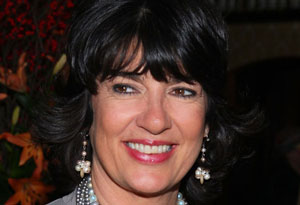Christiane Amanpour's Aha! Moment

Photo: Mike Coppola/Getty Images
The intrepid foreign correspondent and new host of ABC's This Week lived a sheltered childhood in Iran, until a "seismic political shift" in her country opened her eyes and gave her life purpose.
In 1978 I was 20 and living with my family in Iran. I was between high school and college, trying to figure out what to do with myself. But I always assumed a few things were fairly certain: I would marry early, stay in Iran, and continue to live a relatively sheltered life. The Iranian Revolution changed all that. I remember sitting on the porch with my parents and sisters in the evenings listening to the low, rumbling voice of Ayatollah Khomeini broadcast from the nearby mosque, preaching prayer and revolution. We'd all look at each other, wondering what this seismic political shift would mean—both for our lives and for our country. At the time, Iran was a monarchy, and under the shah, people hadn't been involved in politics—certainly not my family. We didn't know you could question the system.
Eight months before the shah was overthrown, I was in the living room with my father. He was staring out the window, and he said, "It's all over. Nothing is ever going to be the same." When your father, the adult you most depend on, says that, and you can feel his deep, deep sadness, uncertainty, and fear, it has an effect.
To quell protests, the shah instituted martial law, with a curfew of 9 P.M. One night, when my father and I were walking home from a dinner party, soldiers suddenly came upon us and pointed their bayonets at us, forcing us to hurry home.
Those were scary, uncertain times, but each hardship solidified in my mind that I wanted to be in the middle of global events. Not as a victim, as I had been, but as a storyteller. I'd found my life's mission, and there was no looking back.
Then something serendipitous happened: My sister had been attending a small journalism college in London, but she decided after one term that she didn't want to continue. To avoid our family having to forfeit the tuition, I took her place. That's why I sometimes call myself an "accidental journalist." Six months later, I realized I needed to come to the United States; I thought, If I have a mission and work hard, I can be successful in this country.
I studied at the University of Rhode Island, got an internship at a local news station, and then went to CNN—which had been in existence only three years. I've now been telling stories from around the world for more than two decades. When I think back on that time in Iran, I know that every one of my experiences then gave me the insight and empathy to communicate with the American people—whether it's illuminating the human story behind civil conflict or continuing the exploration of Islam. What happens globally impacts America every day, and I am committed to making the world understandable.
NEXT: What's the best career for you?
Read Another Aha! Moment






